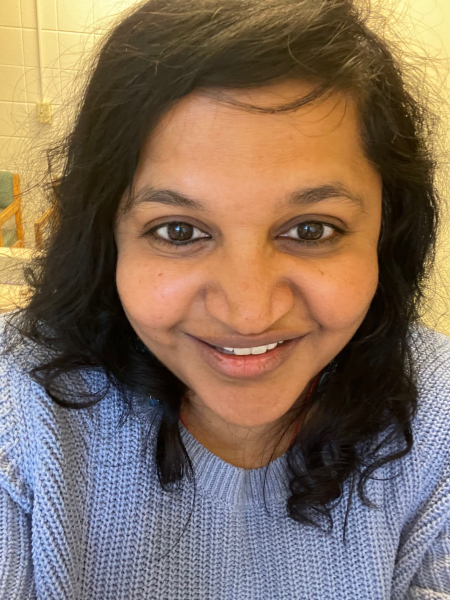Associate Professor
About
Office Hours:
Wednesday 12 - 2 pmRole:
FacultyPosition:
- Associate Professor
Concentration:
- Health Communication,Persuasion, Media Effects
Department:
- Journalism & Media Communication
Education:
- Ph.D., University of Wisconsin-Madison
Biography
Dr. Gayathri Sivakumar is an Associate Professor in the Department of Journalism and Media Communication, Colorado State University. She has conducted research in the areas of health communication, political communication, and children and media. Her research is centered around examining the cognitive, attitudinal, and behavioral effects of mediated communication. She is most interested in understanding how people use mediated communication to shape their beliefs, attitudes, opinions, and even behaviors related to these issues.
Publications
Shaw, B.R., Sivakumar, G., Balinas, T., Chipman, R. & Krahn, D. (2013). Testing the feasibility of mobile audio-based recovery material as an adjunct to intensive outpatient treatment for veterans with substance abuse disorders. Journal of Technology in Human Services, 31(4), 321-336.
Mares, M.L., & Sivakumar, G (2014). ‘Vamenos means go, but that’s made up for the show’: Young children’s reality confusions and learning from educational TV. Development Psychology, Vol 50(11), 2498-2511.
Mares, M. L., Sivakumar, G., & Stephenson, L. (2015). From meta to micro: Examining the effectiveness of educational TV. American Behavioral Scientist, 59(14), 1822-1846.
Sivakumar, G., Mares, M.-L. (2016). The Doctor Versus the Internet: Effects of Low-, Medium-, and High Quality Websites on Intentions to Follow the Doctor’s Advice. Health Communication, 1-9.
Yan, W., Sivakumar, G., & Xenos, M. A. (2017). It’s not cricket: examining political discussion in nonpolitical online space. Information, Communication & Society, 1-17.
Lutz, S., Sivakumar,G. (2020). Leaking the Secret: Women’s Attitude Towards Menstruation and
Menstrual – Tracker. Gender, Technology and Development
Anderson, A. A., & Sivakumar, G. (2021). Risks Elaborated vs. Risks Downplayed: The Effect of Risk Comparisons in Mainstream Media During Covid-19 on Risk Perceptions and Anxiety Levels. Frontiers in Communication, 6, 121.
Kelp, N. C., Witt, J. K., & Sivakumar, G. (2021). To Vaccinate or Not? The Role Played by Uncertainty Communication on Public Understanding and Behavior Regarding COVID-19. Science Communication, 10755470211063628
Sharma, N & Sivakumar,G. (2022). Social media, political discourse and the 2019 elections in India:
Journalists’ perspectives on the changing role of the mainstream media in setting political agenda.
Global Media and Communication Journal.
Courses
-
JTC 414: Media Effects
SyllabusThis course explores the role and effect of mass media on our lives. We will consider social scientific theories and empirical studies on people’s use of media and the consequences of such usage.
-
JTC 270: Analyzing Data for Journalism and Media
SyllabusThis course is designed to provide you with an understanding of the fundamental concepts of basic statistics. By the end of this course, you should gain a good understanding of how to interpret and present statistics and data to better communicate with one’s audience. In this class, you will develop skills for data description, visualization, estimation, and testing of differences and associations.
